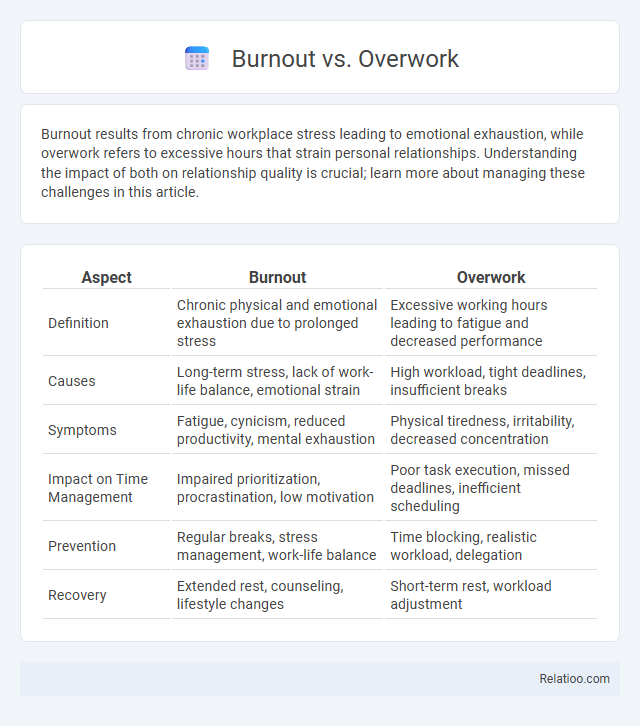Burnout results from chronic workplace stress leading to emotional exhaustion, while overwork refers to excessive hours that strain personal relationships. Understanding the impact of both on relationship quality is crucial; learn more about managing these challenges in this article.
Table of Comparison
| Aspect | Burnout | Overwork |
|---|---|---|
| Definition | Chronic physical and emotional exhaustion due to prolonged stress | Excessive working hours leading to fatigue and decreased performance |
| Causes | Long-term stress, lack of work-life balance, emotional strain | High workload, tight deadlines, insufficient breaks |
| Symptoms | Fatigue, cynicism, reduced productivity, mental exhaustion | Physical tiredness, irritability, decreased concentration |
| Impact on Time Management | Impaired prioritization, procrastination, low motivation | Poor task execution, missed deadlines, inefficient scheduling |
| Prevention | Regular breaks, stress management, work-life balance | Time blocking, realistic workload, delegation |
| Recovery | Extended rest, counseling, lifestyle changes | Short-term rest, workload adjustment |
Understanding Burnout vs Overwork
Burnout is a state of emotional, physical, and mental exhaustion caused by prolonged stress, often characterized by feelings of detachment and reduced accomplishment. Overwork refers to exceeding reasonable work hours or effort, leading to fatigue but not necessarily resulting in burnout unless stress becomes chronic. Distinguishing burnout from overwork involves recognizing burnout's deeper psychological impact, including cynicism and a loss of motivation, beyond the physical strain seen in overwork.
Key Symptoms of Burnout
Burnout is characterized by chronic exhaustion, cynicism, and reduced professional efficacy, distinguishing it from overwork, which primarily involves excessive workload without the emotional depletion typical of burnout. Key symptoms of burnout include persistent fatigue, detachment from work, and feelings of ineffectiveness, impacting your productivity and mental health. Recognizing these signs early helps in managing stress and preventing long-term psychological consequences.
Signs of Overwork
Signs of overwork include chronic fatigue, increased irritability, difficulty concentrating, and frequent headaches, which can severely impact your productivity and well-being. Persistent work overload may also lead to sleep disturbances and a weakened immune system, signaling that your body is under excessive stress. Recognizing these symptoms early helps prevent progression to full burnout, where emotional exhaustion and detachment become more pronounced.
Causes Behind Burnout
Burnout primarily stems from chronic workplace stress that remains unresolved, often resulting from excessive workload, lack of control, and insufficient rewards. Overwork contributes significantly to burnout by overwhelming your physical and mental capacities without adequate rest or recovery time. Identifying these root causes is crucial to developing effective strategies to prevent burnout and maintain long-term productivity and well-being.
What Triggers Overwork?
Overwork is primarily triggered by excessive workload, unrealistic deadlines, and high job demands that surpass Your capacity to manage effectively. Constant pressure to perform without adequate rest leads to physical and mental exhaustion, which can escalate into burnout if ignored. Recognizing early signs like chronic fatigue and reduced productivity can help prevent the detrimental effects of overwork on overall well-being.
Impact on Mental and Physical Health
Burnout leads to chronic exhaustion, reduced motivation, and emotional detachment, severely affecting your mental health by increasing anxiety and depression risks. Overwork causes physical strain, sleep disturbances, and weakened immune function, resulting in fatigue and vulnerability to illness. Both burnout and overwork contribute to long-term health issues, making balanced workload management essential for maintaining overall well-being.
How to Differentiate Burnout from Overwork
Burnout is characterized by chronic physical and emotional exhaustion, cynicism, and reduced professional efficacy, while overwork primarily involves excessive workload and prolonged working hours without adequate rest. Differentiating burnout from overwork requires assessing emotional symptoms such as detachment and feelings of helplessness, which are absent in simple overwork scenarios. Monitoring changes in motivation and mental health alongside workload can help identify if an individual is experiencing burnout rather than just overwork.
Prevention Strategies for Burnout
Effective prevention strategies for burnout include establishing clear work-life boundaries, promoting regular breaks, and encouraging open communication about stress levels in the workplace. Organizations should implement wellness programs, provide mental health resources, and foster supportive leadership to reduce chronic stress and emotional exhaustion. Prioritizing workload management and ensuring employees have autonomy over their tasks significantly mitigate the risk of burnout.
Managing Overwork for Better Productivity
Managing overwork is essential to prevent burnout and maintain sustainable productivity. Implementing clear boundaries, prioritizing tasks, and scheduling regular breaks promotes mental clarity and reduces stress. Leveraging time management techniques like the Pomodoro method and task delegation enhances focus while preventing exhaustion.
Seeking Help: When to Act
Recognizing the signs of burnout, such as chronic exhaustion and detachment, is crucial for seeking professional help before reaching a breaking point. Overwork typically leads to physical fatigue and decreased productivity, signaling the need for immediate rest and workload management. Timely intervention involving mental health support and organizational changes can prevent the progression from overwork to full burnout, ensuring sustainable well-being and performance.

Infographic: Burnout vs Overwork
 relatioo.com
relatioo.com